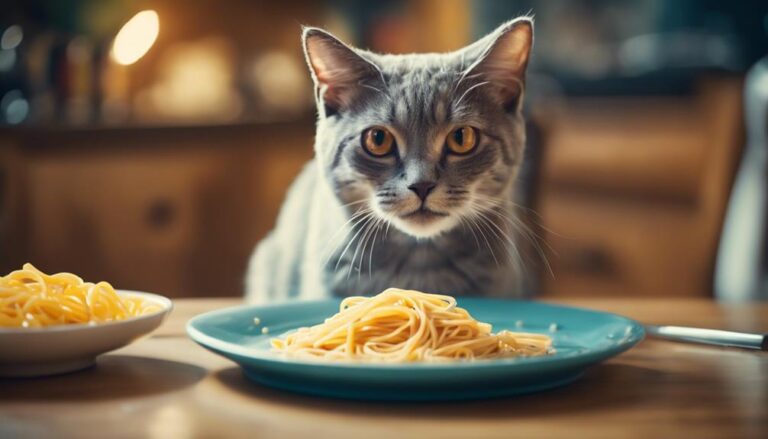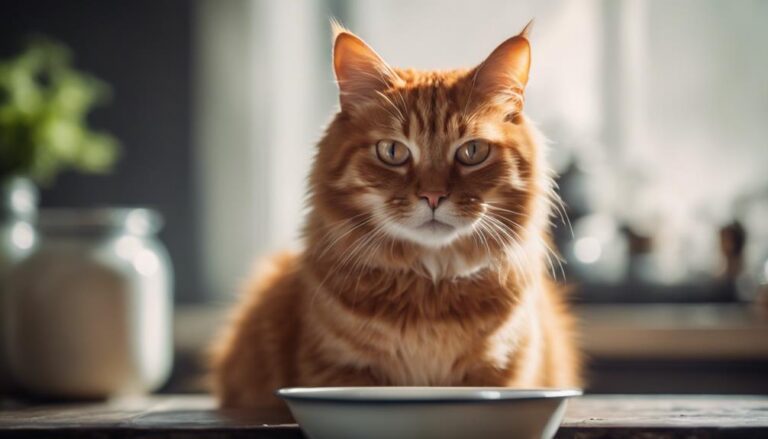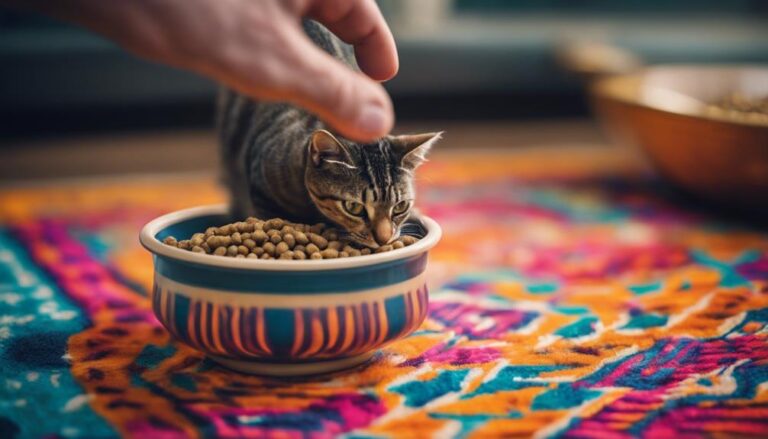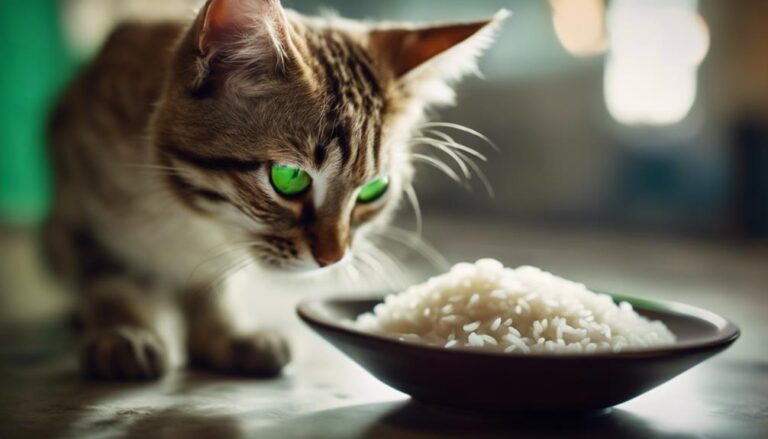You may have pondered whether tofu is a suitable addition to your feline friend's diet. While the thought of offering tofu to your cat might seem intriguing, it's essential to consider various factors before making a decision. Tofu can elicit mixed reactions among experts, with some cautioning against its regular inclusion in a cat's meals. Before you make a call on whether tofu is a viable option for your cat, let's explore the intricacies and potential implications of cats consuming this plant-based protein source.
Potential Risks of Feeding Tofu to Cats
Feeding tofu to cats can pose potential risks due to their limited ability to digest plant-based proteins effectively. While cats are obligate carnivores, meaning their diet should primarily consist of meat, giving them a small amount of tofu as an occasional treat may not be harmful. However, their digestive system isn't designed to break down plant material like tofu efficiently.
Tofu may contain toxic ingredients like onions, which are harmful to cats if consumed. Even though commercially available tofu is generally safe for cats to eat in moderation, it's crucial to remember that it shouldn't replace their regular diet. If cats ingest large quantities of tofu, they may experience diarrhea, vomiting, and discomfort. Therefore, when considering pet care and what to feed your feline friend, it's essential to be cautious about introducing tofu into their diet and to monitor their reactions closely.
Recommended Alternatives to Tofu for Cats
When considering your feline companion's diet, prioritize offering meat-based alternatives to tofu for optimal health. Cats are obligate carnivores, meaning their diet should mainly consist of meat to meet their nutritional needs.
Instead of feeding tofu, opt for high-quality cat food that includes animal proteins like chicken, turkey, or fish. These meat-based options provide essential amino acids that cats require for proper growth and maintenance.
When treating your cat, choose small pieces of cooked meat as a snack rather than tofu to ensure they receive the necessary nutrients without the risks associated with tofu.
Tofu's Impact on Cats' Nutritional Needs
Tofu's lack of essential amino acids crucial for cats' dietary requirements highlights the importance of understanding its impact on their nutritional needs.
Cats need specific nutrients like taurine, arachidonic acid, and vitamin A that are naturally found in animal-based foods but are lacking in tofu. As obligate carnivores, cats rely on meat to fulfill these nutritional needs.
Feeding cats tofu as a primary food source can result in significant nutritional deficiencies, potentially leading to health issues over time.
While tofu can be offered to cats as an occasional treat, it shouldn't replace meat in their diet. Due to its incomplete protein profile, regular consumption of tofu may cause digestive problems in cats.
It's essential to prioritize a balanced diet for your feline companion to ensure they receive all the necessary nutrients for optimal health and well-being.
Moderation in Offering Tofu to Cats
Incorporate tofu into your cat's diet in moderation as an occasional treat to ensure their nutritional balance and well-being. While cats can snack on small portions of plain tofu alongside their regular cat foods, it's essential to remember that tofu shouldn't replace a balanced meat-based diet for your feline friend.
Homemade tofu without harmful seasonings is a safer option when considering adding this food to your cat's diet. Remember that tofu can be served as a snack, but it shouldn't be the primary source of nutrition for your cat.
Ensuring moderation in offering tofu to your cat helps in maintaining their overall health and prevents any potential dietary imbalances. By keeping an eye on the amount and frequency of tofu consumption, you can introduce this food in a way that complements your cat's existing diet without causing any disruptions to their nutritional needs.
Monitoring Cats for Tofu Allergies
Watch your cat closely for any signs of tofu allergies, such as vomiting, diarrhea, itching, or redness. If you notice any adverse reactions, consider reducing or eliminating tofu from their diet.
It's crucial to seek advice from a veterinarian for proper diagnosis and guidance on managing potential tofu allergies in your cat.
Tofu Allergy Symptoms
If you notice your cat experiencing symptoms such as vomiting, diarrhea, or skin irritation, it could be a sign of a tofu allergy. Tofu allergies in cats may also present as itching, difficulty breathing, sneezing, or coughing. These symptoms can range from mild discomfort to severe reactions.
Immediate veterinary attention is crucial if your cat shows severe allergic responses to tofu. Monitoring your cat for tofu allergies involves observing changes in behavior, appetite, or physical appearance. Keep a close eye on your cat after consuming tofu to watch for any signs of allergic reactions.
Remember that each cat may react differently to tofu, so it's essential to be vigilant and seek help if needed.
Managing Tofu Intake
Keeping a keen eye on your cat for any signs of tofu allergies is crucial for their well-being and health. Cats can develop allergic reactions to soy products like tofu, leading to symptoms such as vomiting, diarrhea, skin problems, and gastrointestinal distress. After feeding your cat tofu or any soy-containing cat food, monitor them closely for any adverse reactions. Look out for changes in behavior, appetite, or litter box habits.
If you notice any concerning symptoms, it's important to seek veterinary advice promptly. By staying vigilant and observing your cat's response to tofu intake, you can help ensure their safety and well-being. Remember, your cat's health is a top priority, so always be proactive in managing their diet.
Seeking Veterinary Advice
To ensure your cat's well-being, it's crucial to monitor them closely for any signs of allergies when introducing tofu into their diet. Keep an eye out for symptoms like itching, skin redness, or gastrointestinal disturbances which could indicate tofu allergies.
If you notice any signs of allergies, especially skin redness, it's essential to seek veterinary advice promptly. Tofu allergies in cats can present with various symptoms, ranging from mild skin issues to severe respiratory problems or even anaphylactic reactions.
Consult your veterinarian to determine the best course of action if you suspect your cat is allergic to tofu. Remember to document any changes in behavior post-tofu consumption to assist the vet in diagnosing and treating your cat effectively.
Consulting a Vet About Tofu for Cats
Before incorporating tofu into your cat's diet, consult a veterinarian to ensure it suits their dietary requirements and overall health. When seeking advice from a vet about feeding tofu to cats, it's important to note the following:
- Cats can eat tofu as it isn't toxic to them.
- Consulting a vet can provide valuable veterinarian guidance on incorporating tofu into your cat's diet.
- It's essential to consider your cat's specific dietary needs when introducing tofu.
- Veterinarians can advise on the appropriate portion sizes and feeding frequency for your cat's optimal health.
Frequently Asked Questions
Are Tofu Safe for Cats?
Tofu is not safe for cats. It lacks essential nutrients, can cause digestive issues like diarrhea and vomiting, and contains sugars that cats can't digest well. Avoid feeding tofu to your feline friend for their well-being.
Can Cats Eat Soy?
Avoid feeding cats soy products. Soy can trigger allergies in cats, leading to symptoms like vomiting and diarrhea. Additionally, soy may contribute to health issues such as goiter and hypothyroidism. Stick to cat-friendly foods.
What Vegan Food Can Cats Eat?
For your furry friend, consider safe vegan options like small amounts of plain veggies or fruits like steamed carrots or blueberries as occasional treats. Always monitor for any negative reactions and consult your vet for guidance.
What Foods Must Cats Not Eat?
Avoid feeding cats foods like onions, garlic, grapes, raisins, chocolate, lilies, tulips, daffodils, processed meats high in fat, sugar, salt, xylitol, caffeine, alcohol, raw meat, fish. Keep them safe and healthy.






